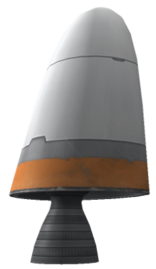Difference between revisions of "Mk-55 "Thud" Liquid Fuel Engine"
m (→Usage: *link more specific;) |
(→Usage) |
||
| Line 7: | Line 7: | ||
The low thrust (and radial mounting) makes a single Mk55 unsuitable as a main engine on most lower stages, but it can be used to augment other engines. A common use of this engine is in lander designs, as it eliminates the need to have a vulnerable engine in an easily-damaged position. The I<sub>sp</sub> of this engine is quite poor (290 at 1 atm and 320 in vacuum) which limits its usefulness. It is recommended to not be used in atmospheric landings. | The low thrust (and radial mounting) makes a single Mk55 unsuitable as a main engine on most lower stages, but it can be used to augment other engines. A common use of this engine is in lander designs, as it eliminates the need to have a vulnerable engine in an easily-damaged position. The I<sub>sp</sub> of this engine is quite poor (290 at 1 atm and 320 in vacuum) which limits its usefulness. It is recommended to not be used in atmospheric landings. | ||
| + | |||
| + | Also, landing legs can be added to these engines. This is an advantage shared between radial engines, such as the LV-1R, Rockomax 24-77 and the Mark 55. | ||
As of 0.18.2, this engine has the highest range of gimbal with 3 degrees. | As of 0.18.2, this engine has the highest range of gimbal with 3 degrees. | ||
Revision as of 20:26, 11 December 2013
| Mk-55 "Thud" Liquid Fuel Engine | ||
| Liquid fuel engine by Rockomax Conglomerate | ||
| Radial size | Radial mounted | |
| Cost | (total) | 820.00 |
| Mass | (total) | 0.900 t |
| Drag | 0.2 | |
| Max. Temp. | 2000 K | |
| Impact Tolerance | 7 m/s | |
| Research | | |
| Unlock cost | 3 500 | |
| Since version | 0.16 | |
| Part configuration | liquidEngineMk55.cfg | |
| Maximum thrust | (1 atm) | 108.20 kN |
| (vacuum) | 120.00 kN | |
| Isp | (1 atm) | 275 s |
| (vacuum) | 305 s | |
| Fuel consumption | 8.02 | |
| Thrust vectoring | 8 ° | |
| Testing Environments | ||
| On the surface | Yes | |
| In the ocean | Yes | |
| On the launchpad | Yes | |
| In the atmosphere | Yes | |
| Sub-orbital | Yes | |
| In an orbit | Yes | |
| On an escape | Yes | |
| Docked | No | |
| Test by staging | Yes | |
| Manually testable | Yes | |
| Packed volume | None | |
The Rockomax Mark 55 Radial mount engine requires fuel from external liquid fuel tanks, and must be either connected beneath them or be on the receiving end of a fuel line.
Usage
The Mark 55 is the third liquid fuel engine with thrust vector control, that allows efficient control of the rocket during descent and landing. The Mk 55 is fairly low thrust, however this is offset by its comparatively low weight. The engine has a comparable TWR with the LV-T45.
The low thrust (and radial mounting) makes a single Mk55 unsuitable as a main engine on most lower stages, but it can be used to augment other engines. A common use of this engine is in lander designs, as it eliminates the need to have a vulnerable engine in an easily-damaged position. The Isp of this engine is quite poor (290 at 1 atm and 320 in vacuum) which limits its usefulness. It is recommended to not be used in atmospheric landings.
Also, landing legs can be added to these engines. This is an advantage shared between radial engines, such as the LV-1R, Rockomax 24-77 and the Mark 55.
As of 0.18.2, this engine has the highest range of gimbal with 3 degrees.
Description
| “ | After an intensive search for an engineer crazy enough to plan and build a revolutionary new engine type, researchers stumbled across Eugene Kerman - or, as he's known by night... THE CONSTRUCTOR! He failed miserably, and this is what we got instead. — Jebediah Kerman's Junkyard and Spaceship Parts Co. |
” |
Changes
- Mass reduced from from 1.5 to 0.9, gimbal range increased to 3°, Isp curve changed from 330 vacuum/280 atmosphere to 320 vacuum/290 atmosphere, heat production increased from 300 to 350.
- Renamed 'Mark 55 Radial mount engine' to 'Rockomax Mark 55 Radial Mount Liquid Engine'
- Thrust increased from 80 kN to 120 kN.
- Initial Release
